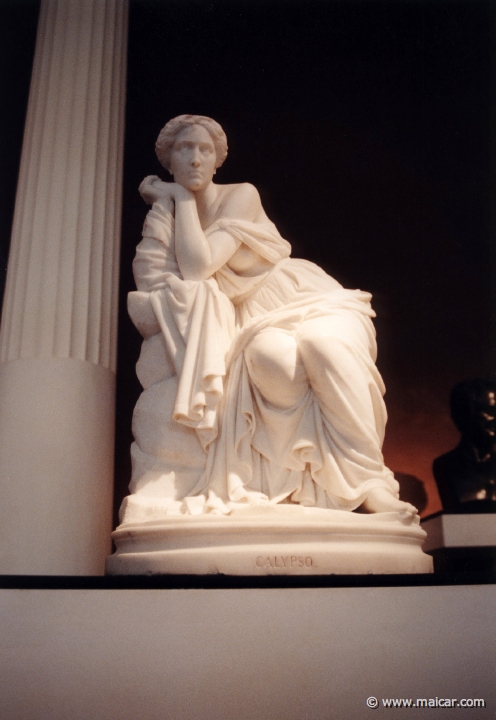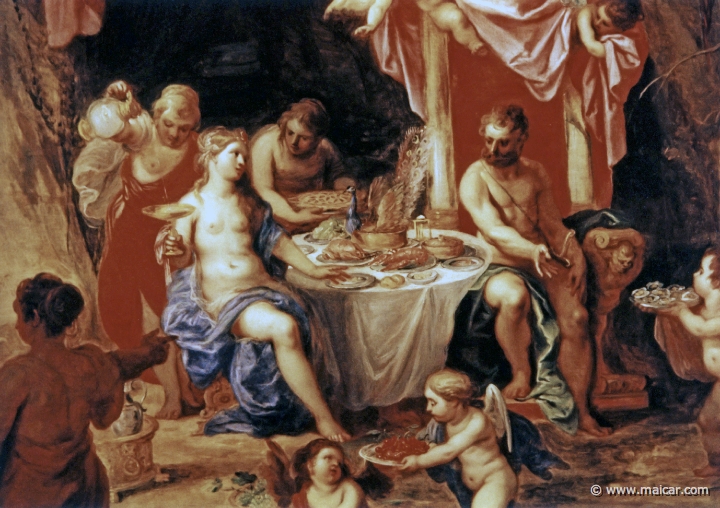|

|
Calypso 3. 4318: Anatole Calmels 1822-1906: Calypso, 1853. Musée de Picardie, Amiens.
|
|
|
"Cruel folk you are, unmatched for jealousy, you gods who cannot bear to let a goddess sleep with a man." (Calypso 3 to Hermes, who has just ordered her to release Odysseus. Homer, Odyssey 5.120).
"Mighty goddess, be not wroth with me for this. I know full well of myself that wise Penelope is meaner to look upon than you in comeliness and in stature, for she is a mortal, while you are immortal and ageless. But even so I wish and long day by day to reach my home, and to see the day of my return." (Odysseus to Calypso 3. Homer, Odyssey 5.220).
|
|
The goddess Calypso 3, who dressed a certain day in a long silvery mantle, with a golden belt round her waist, and a veil over her head, received the shipwrecked Odysseus in
her home with kindness and love, offering to make
him immortal and ageless. But he, wishing to return
home, felt not like a guest but like a prisoner,
and rejected her offer.
How Odysseus landed
in Ogygia
When returning from Troy, Odysseus' ship came for
the second time between Scylla 1 and Charybdis, the feared
monsters that were at each side of the strait
separating Italy and the island of Sicily. It was
then that Zeus, in order to
placate Helius, who was
angry against Odysseus' comrades because they had being insolent enough to kill his immortal cattle when they were in the Island of the Sun, thundered and struck the vessel by lightning. This was the end of the remainder of Odysseus' army; for
here all his comrades drowned once the ship was
destroyed. But Odysseus himself, after having lashed the broken keel and
the mast together as a raft, managed to stay afloat
and escape Charybdis'
whirlpool. For when the monster sucked the water
down, and with it the raft, Odysseus clinged to a
branch of a fig tree until Charybdis spewed up
the mast and the keel, which the monster did
several hours later. Then he dropped into the water
and, bestriding the raft, he rowed away with his
hands. After having drifted for nine days, Odysseus was washed up,
in the night of the tenth, on the remote Island of
Ogygia, the exact location of which, in the western
Mediterranean Sea, has been forgotten.
Calypso 3 receives him kindly
The goddess Calypso 3, who lived in a cave sheltered by alders, aspens and cypresses, received him kindly and looked after him. And having fallen in love with him and wishing him to stay with her forever, she offered to make him immortal and ageless. But Odysseus refused the beautiful goddess' splendid offer. And
instead of living the sorrowless life of an
immortal, being cherished by a lovely goddess, he
chose to languish in misery in this golden prison,
longing for Ithaca and Penelope. Such was the
nature of the love he felt for his wife and the
island realm that he had left years ago against his
will, when King Agamemnon's agent Palamedes outwitted
him, and thereby forced him to join the alliance
that sailed against Troy in
order to obtain, by force or by persuasion, the
restoration of Helen and
the property that had been stolen by the seducer Paris when he visited Sparta.
Tears by day, cold by night
During the day the inconsolable Odysseus sat on the
Ogygian shore, giving himself to tears and
heartache as he looked across the sea, and by night
the cold lover Odysseus slept with the still ardent Calypso 3 in her cavern, a lovely place with many trees and birds and a garden vine with great bunches of grapes trailing round the entrance, and surrounded by four rivulets running in every direction, and meadows where the iris and the parsley flourished. Everything, they say, was so delightful that even an immortal visitor would have gazed in wonder at the goddess' home. However, for Odysseus this island
was the prison that kept him away from home for
seven years, or perhaps five, or as others say, for
only one. But Athena, who
never desert her favorites, as long as they stay
civilized, intelligent and self-possessed,
presented Odysseus'
case to Zeus, and the god
ordered the heavenly envoy Hermes to convey the final decision to Calypso 3, which was to let Odysseus go.
Hermes pays a visit to Calypso 3
Now, all immortals know each other, even though
they may live apart, and that is why no one had to
introduce Hermes when he appeared in Calypso 3's cave after his long journey across the sea. The god refreshed himself with the ambrosia that Calypso 3 put on the table, drinking a cup of red nectar to it. However, despite the kind reception, Hermes would have preferred to be elsewhere, for as he
himself said, between Olympus and Ogygia, there was
nothing except the vast expanse of the sea, and
even a god likes to find a city on the way. But as
neither mortals nor immortals can evade Zeus' will, he traveled to
this otherwise lovely place, and delivered to the
dainty goddess the final decision about this case:
"... Now Zeus bids you to send Odysseus off without delay. He is not
doomed to end his days on this island, away from
all his friends. On the contrary, he is destined to
see them yet, to reach his native land, and to step
beneath the high roof of his house." (Hermes to Calypso 3. Homer, Odyssey 5.112).
These were no good news for Calypso 3, and that is why she replied thus:
"Cruel folk
you are, unmatched for jealousy, you gods who
cannot bear to let a goddess sleep with a man, even
if it is done without concealment and she has
chosen him as her lawful consort." (Calypso 3 to Hermes. Homer, Odyssey 5.120).
And recalling how Orion had been shot by Artemis because Eos loved him, and
how Zeus struck Iasion dead
with his thunderbolt because he was loved by Demeter, she thought
that now her own turn had come. This was most
unfair, she reasoned, for after all she had rescued Odysseus from death as
he drifted astride the keel of the same ship that Zeus had shattered with his
lightning. But nevertheless, the gods of the sky
being more powerful than her, she had to comply,
and that is why she, when Hermes had left, told her
guest:
"My unhappy
friend ... as far as I am concerned there is no
need for you to prolong your miseries or waste any
more of your life on this island. For I am ready
with all my heart to help you leave it." (Calypso 3 to Odysseus. Homer, Odyssey 5.160).
Calypso 3 then gave him leave to make a boat, and promised to stock it herself with bread, water and wine, and send a
following wind so that he may reach Ithaca without
difficulties. And as Odysseus could not
believe what he was hearing, and instead suspected
some mischief, she gave him the greatest and most
solemn oath that the gods can take:
"Now let Earth
be my witness, with the broad Sky above, and the
falling waters of the Styx ... that I harbour no
secret plans against you ..." (Calypso 3 to Odysseus. Homer, Odyssey 5.184).
Straight away after this oath, Calypso 3, disregarding the fact that just a little while ago she had protested against Zeus' decision, told Odysseus that she did
this because after all she had a righteous mind and
a heart that, not being indeed of iron, had
compassion.
Persuasion takes over
|

|
0421: Odysseus and Calypso. Hendrik van Balen, Jan Brueghel the Elder and Joos de Momper the Elder. Gemäldegalerie der Akademie der bildende Künste, Wien.
|
|
Now, at times, when Persuasion can no longer act, Force comes to perform the task; but at other times, when Force is exhausted, then Persuasion takes over. That is why Calypso 3, who, after heaven's decision, saw her force ebb away, now resorted to persuasion, while she and Odysseus helped
themselves to the delicacies that the goddess'
maids had spread before them, saying that indeed Odysseus had no idea
about the full measure of misery that he would have
to endure before reaching Ithaca, declaring that if
he did he would never leave Ogygia. She also
invited him to become immortal and share her lovely
home, claiming that she herself could not be
inferior to Penelope,
who was a mortal woman, and therefore unable to
compete with the elegance and looks of a goddess.
Odysseus' final
answer
And Odysseus had to
reply:
"Mighty
goddess, be not wroth with me for this. I know full
well of myself that wise Penelope is meaner to look upon than you in
comeliness and in stature, for she is a mortal,
while you are immortal and ageless. But even so I
wish and long day by day to reach my home, and to
see the day of my return." (Odysseus to Calypso 3. Homer Odyssey 5.220).
Calypso 3 sees him off
When also persuasion failed, Calypso 3, obeying the gods and keeping her oath, gave him tools and led him to the farthest part of the island, where Odysseus cut the timber
down. She also brought him cloth to make the sail,
and on the fifth day Odysseus left the
island in the new built boat, which the goddess
filled with provisions, such as wine, water, corn, and
meats. Some have said that Calypso 3, not being able to find consolation when Odysseus left,
committed suicide, but immortals are not likely to
perform this kind of deed.
Others with identical name: Calypso 1 is counted among the NEREIDS, and Calypso 2 is one of the OCEANIDS.
|